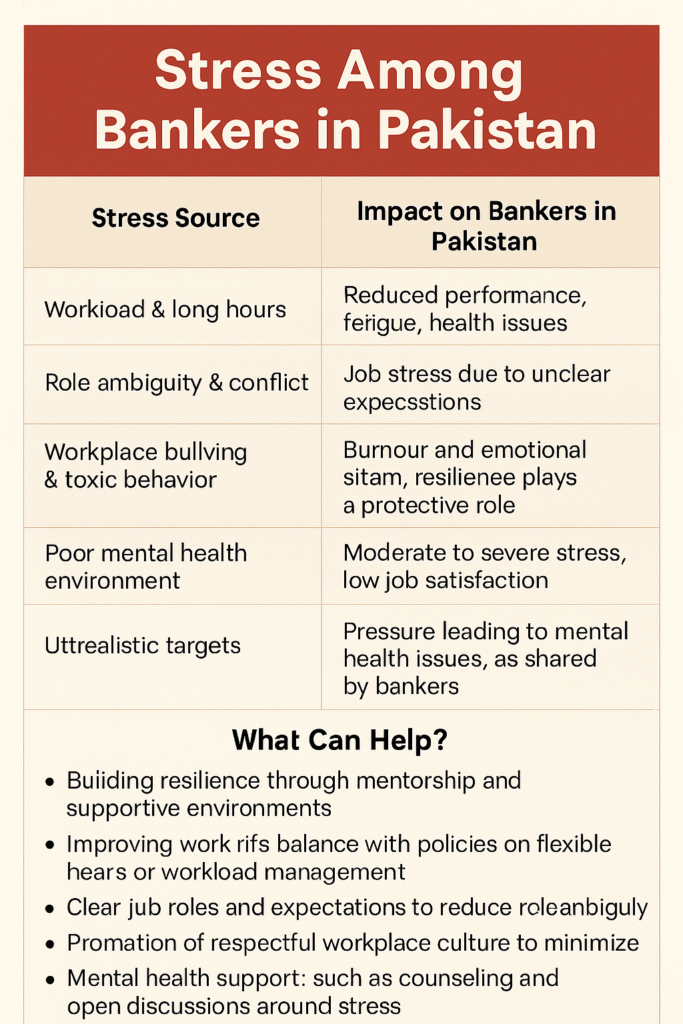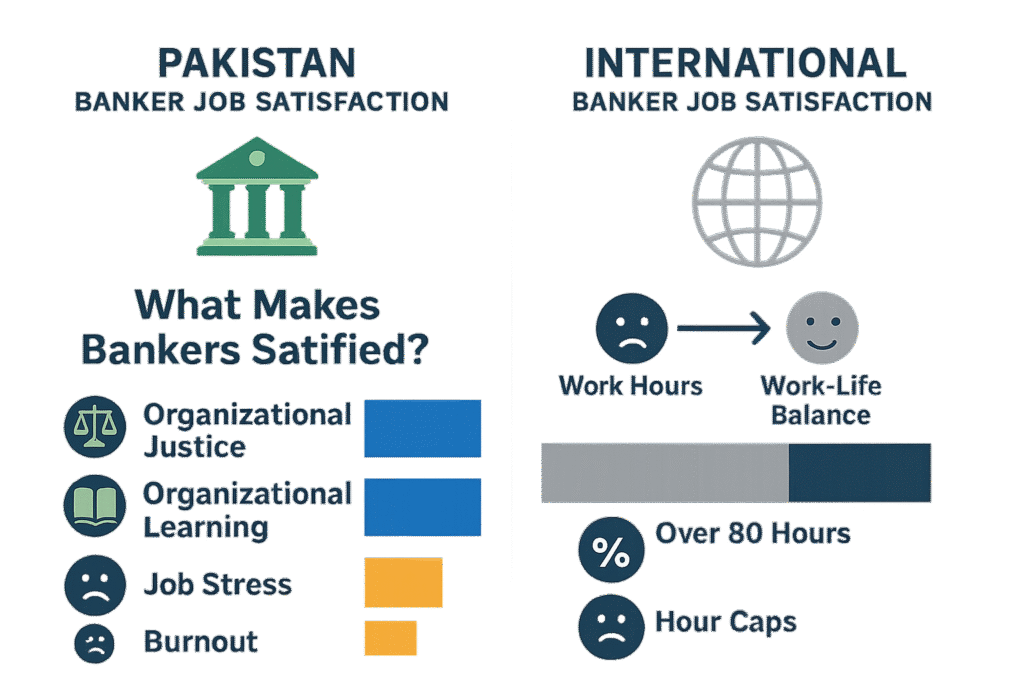Banker Job Satisfaction: A Comparative Review Between International and Pakistani Contexts
Muhammad Mobasher Ali

Introduction to Banker Job Satisfaction
Job satisfaction is a critical aspect of workforce management and organizational success. In the banking sector, employee satisfaction (Banker Job Satisfaction in Pakistan) is directly linked to productivity, customer service quality, and institutional stability. Across the globe, banks face similar structural challenges, such as performance pressures, technological disruption, and regulatory compliance. However, cultural, economic, and operational variations result in different experiences of job satisfaction among bankers internationally and within Pakistan.
Understanding Job Satisfaction in Banking:
Job satisfaction refers to the level of contentment an individual feels regarding their job, encompassing factors like work environment, compensation, career growth, workload, and recognition. Herzberg’s Two-Factor Theory and Maslow’s Hierarchy of Needs remain prominent frameworks used to assess job satisfaction.
In banking, key influences include:
Salary and benefits
Work-life balance
Job security
Career advancement opportunities
Managerial support
Workload and stress levels
A Banker is struggling to balance life with Work and Home/Family/Friends, keeping in view the mentioned factors, the REAL heros to giving boost to economy, facilitators of regulators IRR.
A satisfied employee is a long term investment asset of the bank
Lorem Ipsum
International Perspective on Banker Job Satisfaction
Globally, numerous studies highlight both positive and negative aspects of job satisfaction in the banking industry:
High Stress and Burnout: In developed countries like the UK, USA, and Japan, bankers often face long hours, high performance targets, and significant pressure to meet regulatory and customer expectations. A 2022 Deloitte report noted that nearly 50% of global bankers reported moderate to high workplace stress.
Digital Transformation: The transition to digital banking has shifted job roles, leading to higher demand for IT skills but also causing job insecurity among traditional bankers (PwC, 2023).
Remote Work and Flexibility: European banks have adopted hybrid work models post-COVID-19, improving job satisfaction by promoting flexibility and work-life balance (European Banking Authority, 2022).
Recognition and Training: Banks in countries like Germany, Canada, and Singapore focus heavily on employee training and development, which contributes positively to job satisfaction and retention.
Banker Job Satisfaction in Pakistan
In Pakistan, job satisfaction in the banking sector presents a mixed picture due to economic volatility, workload stress, and organizational dynamics.
Key Influencing Factors:
1. Workload and Stress: Studies have consistently shown that Pakistani bankers experience high stress levels due to long working hours, strict compliance demands, and performance pressures (Usman et al., 2010).
2. Compensation vs. Inflation: The rising cost of living and economic instability often mean that even competitive salaries fail to meet employees’ expectations (Raziq & Maulabakhsh, 2015).
3. Career Advancement: While public sector banks offer better job security, private banks often provide faster promotion but at the cost of higher stress and turnover.
4. Organizational Culture: Many banking institutions still operate in hierarchical structures, where recognition, feedback, and innovation are limited. This reduces employee morale and long-term satisfaction.
5. Gender Dynamics: Female employees in banking face additional challenges such as fewer leadership opportunities and work-life balance issues (Awan & Niazi, 2013).

Comparative Analysis : “Banker Job Satisfaction: A Comparative Review Between International and Pakistani Contexts”
Factor Compensation
International Banks
Pakistani Banks
Work Environment
Increasingly flexible,
hybrid Traditional, in-person Focus
Compensation
Generally competitive Varies;
often affected by inflation & Influences
Career Growth
Structured,
transparent paths Slower in public; fast but stressful in private
Training & Development
High priority
Improving but limited
Work-Life Balance
Improved post-COVID
Often poor, especially in private banks
Gender Equality
Emphasis on inclusion
Still evolving

Recommendations for Improvement in Pakistan
- Enhance Work-Life Balance: Introduce flexible work hours and hybrid work models.
- Training Programs: Invest in regular skills development and employee empowerment.
- Performance-Based Incentives: Align rewards with performance and market realities.
- Employee Feedback Systems: Create channels for regular feedback and recognition.
- Mental Health Support: Provide wellness programs and stress management training.
Conclusion
Banker job satisfaction is essential for sustainable growth in the financial sector. While international banking systems are progressing toward more flexible, inclusive, and employee-centric environments, Pakistan’s banking industry still has a long way to go. By investing in people, adopting technology, and embracing a progressive work culture, banks in Pakistan can greatly enhance job satisfaction and organizational performance.


Excellent brief.
MashaALLAH.
Thanks Sir for appreciation………